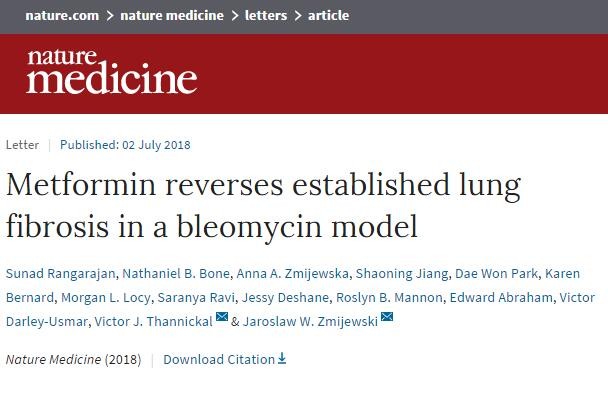Metformin is a safer and widely used first-line drug for the treatment of type 2 diabetes, but scientists have recently found that it can reverse the already produced pulmonary fibrosis.
Researchers at the University of Alabama at Birmingham (UAB) have shown for the first time that the use of drug therapy for cell metabolism can reverse established lung fibrosis, a study recently published in Nature Medicine.

Pulmonary fibrosis may occur after infection of the lungs due to infection, radiation or chemotherapy, but sometimes it is caused by unknown factors such as idiopathic pulmonary fibrosis (IPF). IPF is a type of Sexual, fatal lung disease with more than 5 million patients worldwide. Although scientists have become more aware of the pathogenesis of fibrosis, there is still a lack of effective therapies to reverse the process of fibrosis, and this study provides some new clues.
A team led by professors of UAB medicine, Jaroslaw Zmijewski and Victor Thannickal, revealed the reversal of pulmonary fibrosis and the underlying cellular mechanisms affected by drug treatment.
AMP-activated protein kinase (AMPK) can sense the state of energy in cells and regulate metabolism. The researchers found that AMPK activity in myofibroblasts at the fibrotic site of IPF patients is low, resulting in very active metabolism of these myofibroblasts. Resistant to apoptosis.
Metformin and AICAR activate AMPK activity in lung myofibroblasts of IPF patients, thereby reducing cell fibrosis, and activation of AMPK increases the production of new mitochondria, making myofibroblasts sensitive to apoptosis. Sexual normalization.
The team used the anticancer drug bleomycin to establish a mouse model of pulmonary fibrosis. After three weeks of taking the chemotherapy drug, the lungs of the mice were severely fibrotic. At this time, the researchers treated with metformin for five weeks and found that Metformin accelerated the resolution of established fibrotic tissue, which was not apparent in AMPK knockout mice, indicating that this effect of metformin is AMPK dependent.
The researchers say that AMPK may play a key role in the metabolism by shifting the metabolic balance from anabolism to catabolism to promote the resolution of fibrosis. "In addition, our research provides proof of concept, Even the use of metformin or other drugs to activate AMPK activates signaling pathways that promote fibrotic tissue regression, which will provide an effective strategy for treating progressive fibrotic diseases."
Hot-dip galvanization is a form of galvanization. It is the process of coating iron and steel with zinc, which alloys with the surface of the base metal when immersing the metal in a bath of molten zinc at a temperature of around 840 °F (449 °C). When exposed to the atmosphere, the pure zinc (Zn) reacts with oxygen (O2) to form zinc oxide (ZnO), which further reacts with carbon dioxide (CO2) to form zinc carbonate (ZnCO3), a usually dull grey, fairly strong material that protects the steel underneath from further corrosion in many circumstances. Galvanized steel is widely used in applications where corrosion resistance is needed without the cost of stainless steel, and is considered superior in terms of cost and life-cycle.
Galvanized Steel Pipes,Galvanised Pipe,Galvanised Steel Pipe
JIANGSU SKYPLAN GREENHOUSE TECHNOLOGY CO.,LTD , https://www.thgreenhouse.com